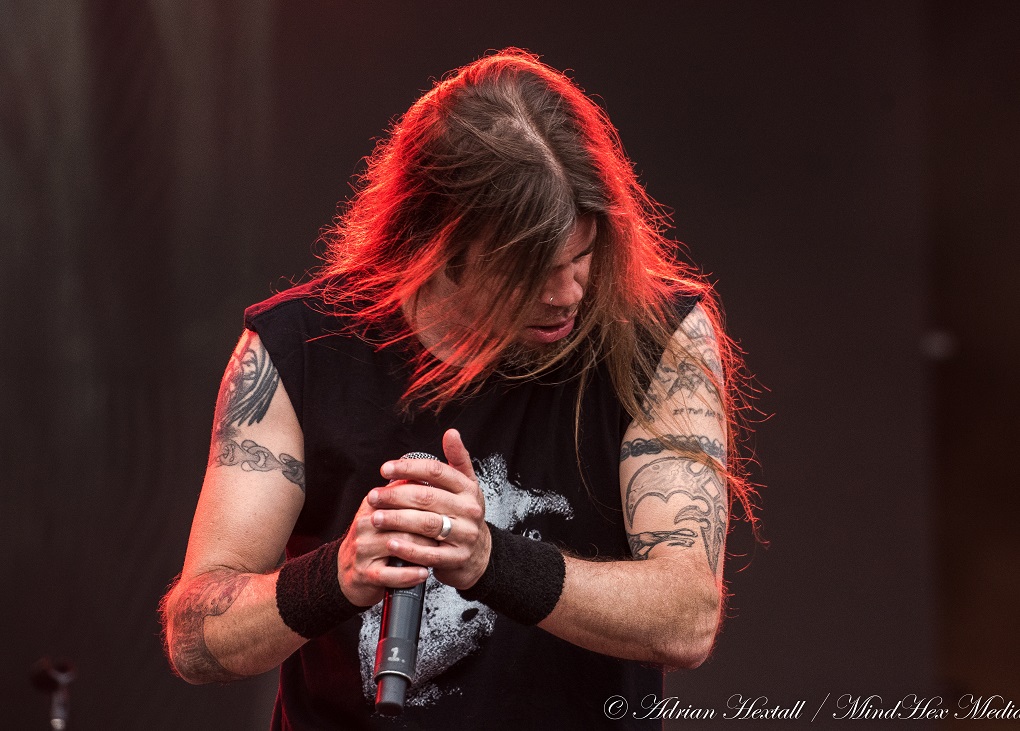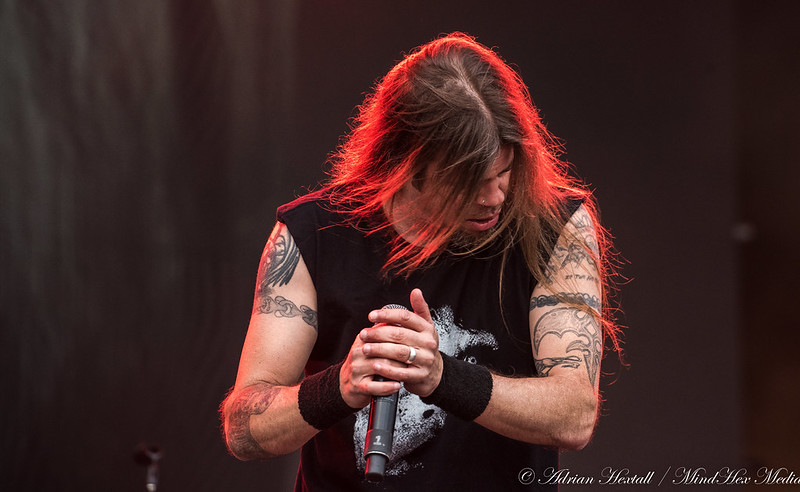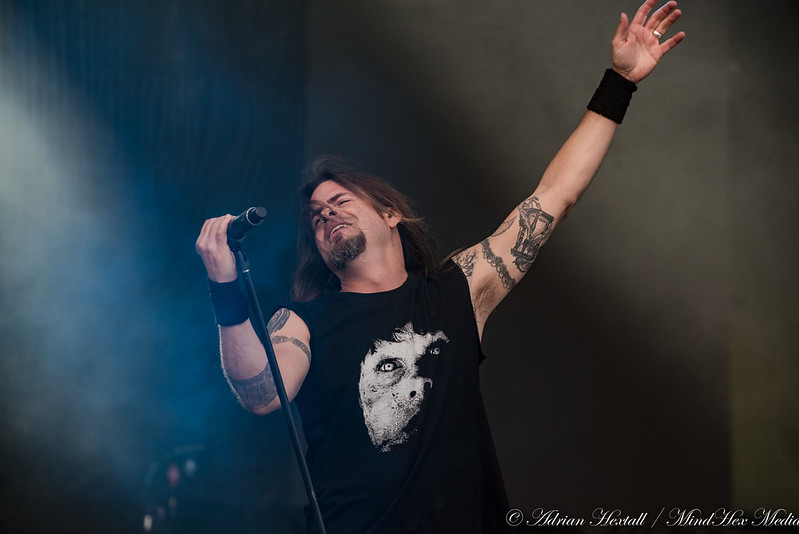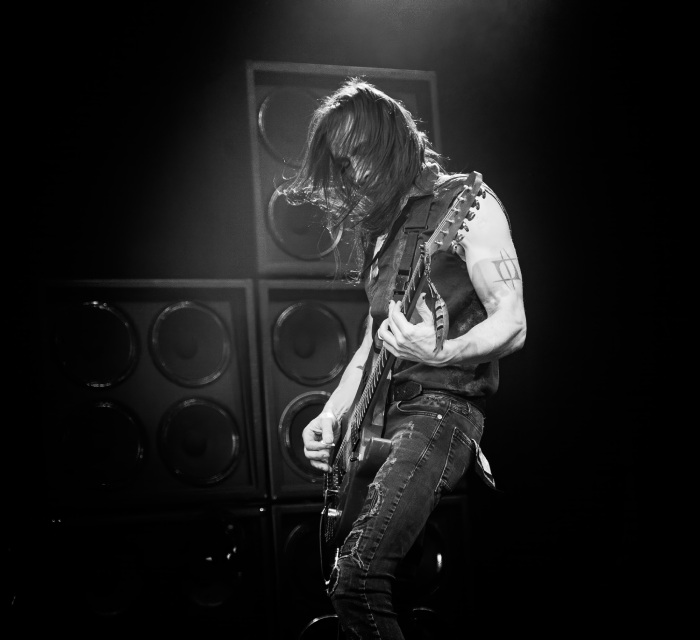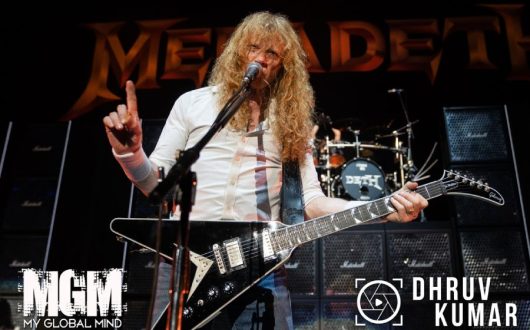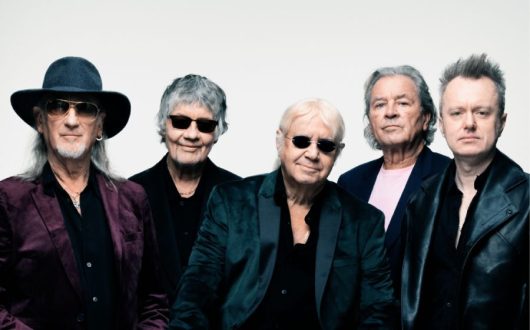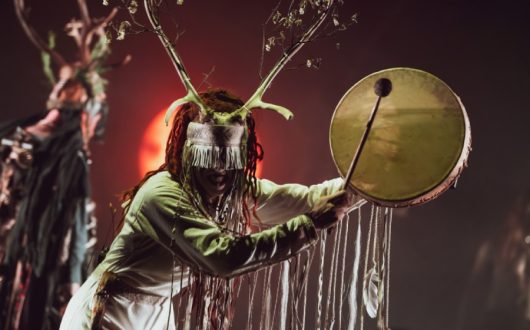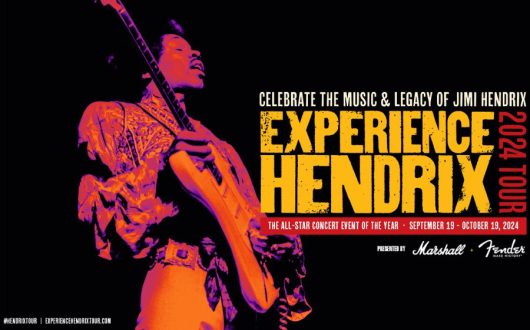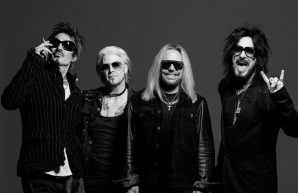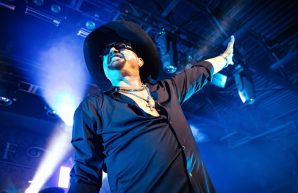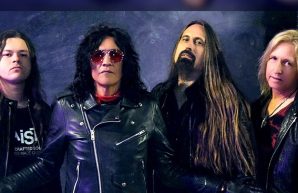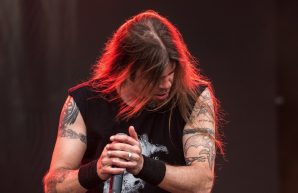Interview and Photos (C) Adrian Hextall / MindHex Media
As global touring came to a sudden and unexpected halt earlier this year, Queensrÿche frontman Todd La Torre has been using his recent pandemic downtime to put the finishing touches on his debut solo album Rejoice In The Suffering. The idea for a solo album was always in the cards for Todd. With Queensrÿche tour dates postponed indefinitely, the world events offered Todd the opportunity to explore his ideas for Rejoice In The Suffering. Todd teamed up with long-time friend and collaborator Craig Blackwell, alongside Zeuss for mixing and mastering, creating a diverse heavy metal album that draws influence from different styles. These styles will surprise fans who only know La Torre from his previous work with Queensrÿche or Crimson Glory before that.
We spoke to Todd at his home in the U.S. about the change in style and what we can expect next from one of the most powerful and dynamic voices in metal.
AH: Debut solo album and I have to ask, would you have been able to do this if 2020 haven’t gone the way it did?
TLT: It would have just prolonged things like it has for many years because when you are touring all the time and then you come home, you know, I do not want to do music, my ears need a break, I just want to hang out and decompress, and sometimes I am only home for a few days and I am on a plane again.
So, I have to go in my studio, start being creative, writing, and recording, it is just I do not like to do that so it would not have been as much of a priority for me because I am less inspired with all of these distractions and travel and whatnot.
The shutdown in mid-March, when I knew that we were going to be not working at that point for several months, I just called Craig and said “Dude, now, we got to do this right now and focus every single day and we can bang this thing out” and we did! It took us four months between writing and recording everything.
AH: How did you achieve this? Was it all you at your location or him at his and you were swapping tracks over the web between you?
TLT: It was both of those things. So, we would do like, you and I right now, you would have your guitar and play something and then I would have my guitar and go “Oh, what about this chord, can you go to this note?” and we would song write that way. Then there were times where I have not been anywhere, I wear my mask and then I go to the grocery store and then I come home, I am totally safe, I am not out with anybody, so we did connect in person many times to record and to go over other aspects of the song writing. Yes, it was a combination.
AH: Because it is just the two of you, I presume you are defaulting back to your original love which of course is the drumming with Craig handling the guitar parts?
TLT: Yes, and Craig also can play drums a little bit, so we would work out the parts and I would say “Hey, do you like this drum part or this drum part?” and he would say “I like that one because look at what I am doing here with the guitar” and I was like “Yes that is what I was thinking”. We kind of work across lines whether I was stumped on a vocal melody and I would say “What do you got, give me something, I do not have anything, I cannot come up with anything right now”. He would say “What about this, or this?”. I am stumped, I do not know where to take the song from here and I would offer suggestions, but you know drums are my passion too and I had a lot of fun working out drum parts for this and yes, it was a lot of fun.
AH: Is that something you have kept going sort of in the background? I know you did the drumming on The Verdict for example but even as a frontman and the singer, have you always in the background been practicing drumming over the years as well?
TLT: No, not really, I have not been playing and practicing for all these years like I would have otherwise. You know when you are eight, nine months out of the year, if you are gone, I might jump on the drums for soundcheck and just noodle around for a minute but actually practicing and trying to work something out and learning to get better, I am not a lot of that which I regret because I would be so much better if I had been doing that all these years, but life gets in the way.
AH: You cannot be disappointed with what you have achieved? The last two major albums that you have worked on, your own and obviously the last Queensrÿche one as well.
TLT: I mean I am really happy and proud of that but as a drummer, there are so many guys that are so much better than I am, but at the same time I think there is a lot of overplaying in drums these days. I think a lot of bands, there are too many guitar notes, I just think there is not enough space and something I always loved about the 60s, 70s, and even the 80s where songs breathe more, there was more room. Now, everybody is trying to cram in something in that space and I think music deserves to breathe. All that wanking and all that showing off does not mean that you are a better drummer in the context of musicality. If you look at Ringo, he was not doing all these [lip trills], you do not need to do that so I think being a great drummer also is having good ears and listening to what the music calls for and I do not play extreme metal where that stuff happens a lot, so I think that the drumming that I have done is great in the context that it exists.
AH: You mentioned extreme metal, now, your album is not an extreme metal album. I think the word “heavy” can certainly sit in front of it. I had seen one fan, I forgot where it was, possibly on Facebook when you are sort of putting forward your thoughts on it, and somebody said, “Why can’t this be the new album from Queensrÿche?” It does not fit, this is so different from what we were expecting from you, and it seems to be a combination of what has been your love of metal music over the years where you were able to take a bit of this, and a bit of that, and a bit of this and make it your own.
TLT: Exactly, so Craig and I would say “What do we like and why do we like it?”. I miss metal that had a lot of good grooves and if we are going to play something heavy, I like to have the balance of a trashy vocal delivery but also have melody and have some singing like actual real singing and a lot of these heavy bands, they are not singers, they are screaming the whole time and while I kind of appreciate that too because that is not easy to do, people think it is just yelling but there is a technique to it but for me, it is very linear [singing]. I can only hear that for so long and I want to hear singing and I think this shows a lot of that on this record. As far as the Queensrÿche thing, it is like to me, that is just stupid it is like, “I have Ferrari, I want to buy another car, I am going to buy the exact same Ferrari”. People are like “No, I want a pick-up truck” or “I want a little Fiat, a little car, or I want a big sedan where my family can get inside”. Why would you want to try to duplicate what you already have? That to me is a waste of time. It is counterproductive. I am already in Queensrÿche and nobody is going to do Queensrÿche better than Queensrÿche. To me, that would be a really stupid thing to do and I do not have any interest in doing it. I have an interest in doing it with Queensrÿche, but this was about doing more heavy music, which Queensrÿche is not, and showing vocal abilities that are certainly not appropriate for Queensrÿche.
AH: Interviewers will always try and say, “Well this sounds like this, so this sounds like so and so”. I have got that down but as a couple of examples, by the time you get to Pretenders, I can hear bits of Primal Fear in there, there is a feel of Ralf Scheepers with the way your vocals work. On the opening track of Dark Matter, you have even got a bit of a Bruce Dickinson-Esque approach going on. It’s almost a spoken approach to the song, to begin with, but it’s got Bruce’s way of doing that spoken vocal signature sound and as I work my way through, get to Darkened Majesty and it is almost like Priest’s Painkiller and I found all these things I can latch on to that I love and of course that draws you into the album.
TLT: Yes, we wear our influences on our sleeve, and those stylistic qualities or some of those new ones is getting embedded in your makeup as you are learning to do something, so if you are learning to play guitar and you are a big fan of Stevie Ray Vaughan or Eric Clapton or whoever, you are starting to learn how to do band and do the [imitating guitar]. That becomes part of your phrasing and all of a sudden, 20 years down the road, you will play something, and you will do that [imitating guitar] there is that little nugget that goes, “Ah, that reminds me of how this guy would play a guitar phrase”. So, when I do something, people say ” Oh, that sounds like Halford because it is gritty and it is high and, in the Pretenders, somebody said to me “Oh, you even trill your R”, You know the word break, like “brr-eak”. He is not the only guy that does it, but it is cool, it sounds cool and why is he the only guy allowed to do it? The chorus to Darkened Majesty has a very Crimson Glory, Queensrÿche style of delivery with those crying nuances and emotional type of thing.
AH: And it is so much different to the way the song opens as well is it not? By the time you get to the chorus, it is a real switch.
AH: One of the things I have scribbled down, of course, is if somebody else was reviewing another album by another artist and they have to go “You know what, this track sounds like Todd la Torre “. I actually picked up what I would have called classic Todd sound as well
TLT: I want to hear this.
AH: I have got Crossroads to Insanity and I have written down it is pure Todd. To me, that particular track is one I would say if anybody else had done this, “My god you sound just like the way Todd la Torre would present this song”.
AH: Well, to be fair I think you have about a dozen on this album, to be honest. That must have been hard work for you?
TLT: It was a hard record to sing but you know what, here is what I have been thinking of lately and I have said it in a couple of interviews a lot of people say, “Well what does Todd sound like, what does he sound like? Because this record does not sound like anything like Queensrÿche and he is forcing himself to sound like Geoff Tate in Queensrÿche because if you listen to his solos, he does not do that,” but if you listen to Vexed, the intro, that is exactly how I would approach a Queensrÿche song..
It’s the same with the chorus of Darkened Majesty or even Critical Cynic, I sing in that clean style but when people say “What does he sound like?” I say I sound like all of this; this is all of me. It is not contrite, and I like to compare it to a guitar if I say, I am gonna give you a guitar with a bridge pickup only and a distortion channel, that is it. Now, how colourful is that guitar gonna sound with no clean channel available to you? No other pickups or pickup selector, no chorus, no reverb, no delay, no wah-wah, no nothing. I like to think I have a distortion channel, a clean channel, an FX pedal, I have different tools in my tool bag that I can utilize when that song calls for that tool. Why would I not want to paint something more colourful and just be like “No, it is black and white and that is my style, I only do black and white.” Sometimes black and white is grey but I have other colours that I can paint with and a lot of singers do not. A lot of singers have one sound, no matter what they sing, it is always going to sound like that guy and then somebody said “Wow that is the guy for Queensrÿche? on Pretenders, I would have never known that” or “That is the guy from One by One who sings Silent Lucidity in concert? I would never think that was the same guy.” That is what I like, so people saying, “What is your sound?”, this is all my sound. People want to force you into “You are only this”. To me, it is a great disservice. If this is my instrument and drums are your instruments, I am gonna say you get two drums, a Hi-hat, a ride, and a crash, no China cymbals, no other type of sounding drums, no chimes, no timbales, nothing. What is going to sound more fun and be more pleasing to a listener when they hear all these elements, the guy with more shit at his disposal.
AH: These days as well when you want to hold the attention of people when attention spans are limited, you got to mix it up to hold everybody to the end.
TLT: The main songs, one through ten, are a fun thing, like you said, when we have actually heard the first three songs and would be like “Oh shit, what is the next one going to sound like?”, because these three, they keep you interested, you really do not know what you are going to get next and I think that is fun.
AH: Very true. If you have done this, you say, everything to sound like, even if everything was like Crossroads to Insanity where it was that style of vocal that I have said is clearly Todd, all the way through it becomes as you say, a little bit same, you are mixing it up, you are holding my attention because I do not know what to expect next. I’ll get to the end. I am not even going to review an album based on the first three tracks because the final seven could be the treasures on the album, who knows.
TLT: Yes, I remember when we put out Vanguard to the Dawn Wall, and somebody was like “Yes, hard pass, no thanks, not interested in buying this album” and I was like “Okay, well do not buy it then, but you really cannot judge this record on that song”. It will be like saying “Metallica’s The Unforgiven, that is too soft”, having no clue of what Metallica’s record is going to be like. It is just close-minded.
You know what, that goes back to that attention span thing like “Oh, I have heard that, so I am gonna write it off and move on to something else”. That is kind of a derivative of that mentality that you are talking about, the attention span.
AH: Definitely. And, has that also made it difficult to decide what to put out as things, like the lead singles?
TLT: Yes and no, I think Darkened Majesty, putting that one out first, I said “Okay, this has got a good groove intro, it has a high thrashy vocal on the verse then you break into this melodic chorus then a break down with a colourful solo, another big chorus, it has more variety.
The biggest base that I have that is gonna hear what I do first is the Queensrÿche audience. Maybe they are gonna hate this record. I think they will identify with the chorus though. So, we will show them this one. My goal was not to really just please those fans. It was to really just put out songs that I like. This is what I want to do and with the hopes that I would be expanding the audience to the heavier stuff. It was not to cater to the audience that just loves Queensrÿche. I want people that maybe don’t listen to Queensrÿche or do not even know who I am that might hear the heavier stuff be like, “Who is that guy?” “Oh, he sings for Queensrÿche”. “That’s the Queensrÿche guy? That does not sound what I would think a Queensrÿche”. “No, I know, this is other stuff he does”. “Oh okay, let me check it out” and then maybe they are curious, “I wonder what they did in Queensrÿche”, and then they listen to some of Queensrÿche. Maybe they are a little more open-minded, get Queensrÿche and try with me, who knows.
AH: It is going to be worth trying and of course then the million-dollar question comes: “If this takes off, how do you tour with it? People will want to see you play this live once live shows are back around again.
TLT: Well, when touring opens up, it is gonna be just Queensrÿche for me. If there is an opportunity where Queensrÿche, maybe we have a month off, or a couple of weeks off and there is an opportunity to go play, open up for a band that I like, or maybe I could do my own little show. I would like to do that; I would like to play this stuff live at some point. If I could go to Europe and play four, five festivals and maybe two club shows and come home, that would be ideal for me.
There is going to be a big crowd there for everybody and it would be great, big exposure, big bang for the buck. You got a big audience, they get to hear it, I get to play this stuff live. By the time I ever do play this stuff live eventually, people will already know the record really well. In comparison to most bands, they put the record out, the tour has just started. They release the record, the tour starts. They start playing the songs, people do not even know it yet. They do not even know the words. By the time I get to do this, people are going to know all these songs and that will make the experience more enjoyable instead of them just going “Okay I am listening to the new stuff, this is cool.”
AH: A final question if I may, I assume you are also doing stuff with Whip [Michael Wilton], I would imagine something will be coming in the not-too-distant future?
TLT: Yes, he is coming back down here in a little less than a month and we are going to keep working on songs here. Eddie does not want to travel because of the pandemic, so he is not going to come. He is writings songs at home. We are doing the back and forth same with Parker, but Zeus will come down, Michael will come down. I have two of his guitars sitting here in my living room because he shipped them here so that instead of playing my guitar, he will have his own guitars. We are going to keep his two guitars; all will stay here. That way, anytime he wants to come over, he will have his guitars to play. So, we are writing new songs and hopefully, we could put something out by May at the beginning of next year, because touring is not going to happen this year.
AH: But in case you have the time now to get whatever you want to put together, right, doesn’t it? There is no pressure.
TLT: Totally.
AH: Thank you very much, best of luck with the album. I am looking forward to putting it on a proper record player and spinning the vinyl.
TLT: Yes and it is mastered for vinyl, it is a separate mastering job just for the vinyl.
AH: Saying all the right things, good man. That is appreciated.
TLT: It will sound great, I promise you.
Rejoice In The Suffering was released globally on February 5, 2021 via Rat Pak Records.
https://ratpakrecordsamerica.com/toddlatorre
